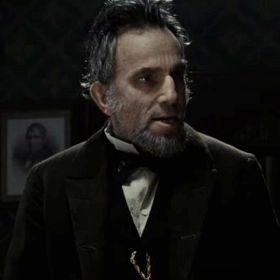My Doubts About Steven Spielberg's 'Lincoln'
The latest trailer for Steven Spielberg’s Lincoln was released during Wednesday’s presidential debates and it has garnered considerable buzz since, with many chomping at the bit to name it the year’s best film. And while I think Lincoln will certainly be a commercial success, its November 9 release date coinciding with election period and the fact that everyone from your grandmother to your little brother is going to fork over the big bucks to see it in theaters, I’m skeptical about its prospects as a truly "great" movie, as it is already being billed.
Those hailing Lincoln’s praises cite that it has many of the components of a critically acclaimed film: a fascinating character (Abraham Lincoln), a tragic and inspiring story, and two of the most respected names in the movie business, Steven Spielberg, one of the most successful directors of the last 30 years who's riding a wave of momentum after his last directorial effort War Horse (2011), came away with six Academy Award nominations, including one for Best Picture, and Daniel Day-Lewis, arguably the best actor alive. And yet, I keep feeling that the whole will be less than the sum of its parts.
For one, whether it’s historically accurate or not, Day-Lewis’ supposedly spot-on Lincoln voice sounds too close to Day-Lewis’ real voice. Part of the wonderful draw of Day-Lewis is that his well-chronicled method acting fully transforms him into his characters, enabling audiences to get lost in his performances. After seeing Gangs of New York, in which Day-Lewis played the brutal Bill “The Butcher” Cutting, I watched an acceptance speech of his and was surprised to find that the man behind Bill “The Butcher's” crass drawl (and later the equally menacing Daniel Plainview in There Will Be Blood), was a soft-spoken British man. Fast-forward to the present day, and in the brief glimpses of this Lincoln trailer I’m very aware that I’m watching Daniel Day-Lewis on screen. This is not a good thing. Maybe it’s just the skeptic in me, but it seems like it would be a hell of a lot more fun to watch Day-Lewis play someone much less noble than our nation's hero.
This seems to be a problem with the rest of the cast, which is filled with a slew of accomplished names (Sally Field, Joseph Gordon-Levitt and Tommy Lee Jones, to name just a few). In the 1:12 mark of the first trailer, Tommy Lee Jones makes an appearance as Thaddeus Stevens, and every time I see his part I laugh out loud. I keep seeing Agent K from Men in Black asking us to help Abraham Lincoln with the Civil War. And I’m not the only one. I’ve been in movie theaters when this scene has elicited chuckles from the audience as well.
After the tepid and unintentionally humorous first trailer, the second trailer ups the stakes. It begins with a pulsing soundtrack and a monologue of Lincoln talking over images of Martin Luther King and the Civil Rights Movement, Nelson Mandela, the fight for women’s suffrage, and the 9/11 memorial. Dreamworks has raised the stakes in this second installment, but can it sustain this energy, which the first trailer so noticeably lacked, over the length of a feature film? I'm not so sure.
Historical films are admittedly difficult territory to navigate considering they forfeit one very key element: surprise. We know how these stories will end. And to focus on a fascinating figure alone is not enough to land a movie of such grand scale a seat at the Oscar table. Just look at Clint Eastwood’s J. Edgar, which was a only a moderate box-office success ($80 million gross on a $35 million budget) and was received poorly by critics (44% rating among critics on Rotten Tomatoes and no Academy Award nominations). These factors put added pressure on tactful execution; such films must present their story in a unique or enlightening manner that gives the viewing public an inside track into the nuances of the time.
I’m not saying Lincoln can’t still be a great movie in the traditional sense, but I think that the elements wildely believed to be working in its favor have actually illuminated a series of potential pitfalls. Abraham Lincoln may have won the war, but can he win the vote of the Academy? We'll just have to wait and see.
RELATED ARTICLES
Get the most-revealing celebrity conversations with the uInterview podcast!






Leave a comment